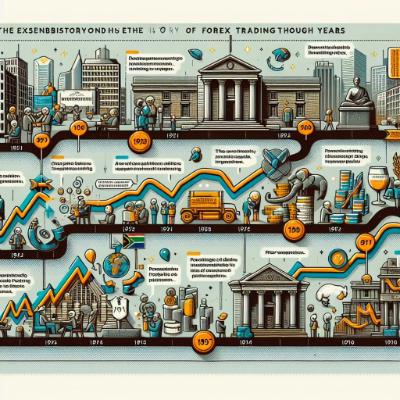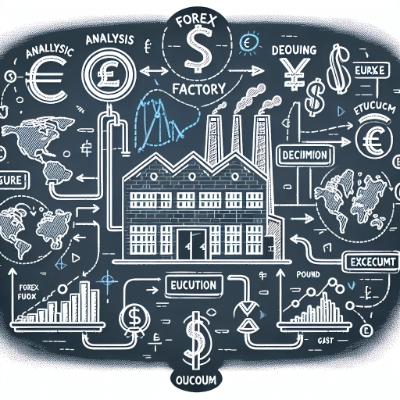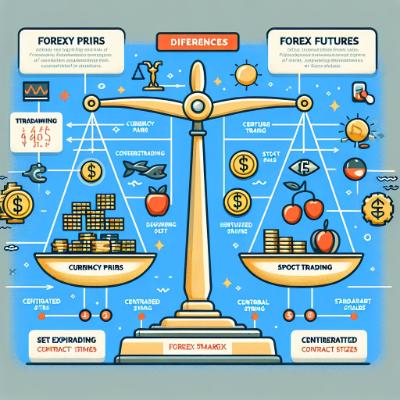A Brief History of the Start of Forex Trading in South Africa

Forex trading has become increasingly popular in South Africa over the years, but have you ever wondered when it all began? Let’s take a journey back in time to explore the fascinating history of Forex trading in South Africa.
Origins of Forex Trading in South Africa
Forex trading in South Africa has a rich history that dates back to the early 1980s. It all started when the country’s financial markets began to open up to international investors and traders. The liberalization of the foreign exchange market allowed individuals and businesses in South Africa to participate in the global currency markets.
During this period, the South African Reserve Bank (SARB) played a crucial role in regulating and overseeing the forex market. The SARB implemented various measures to ensure the stability and integrity of the market, including the licensing of forex brokers and the establishment of rules and regulations for forex trading.
As the forex market in South Africa grew, more and more individuals and businesses started to take advantage of the opportunities it presented. Forex trading became a popular investment option, attracting both experienced traders and newcomers looking to diversify their portfolios.
One of the key factors that contributed to the growth of forex trading in South Africa was the advancement of technology. The introduction of online trading platforms made it easier for individuals to access the forex market and execute trades from the comfort of their own homes or offices.
Today, forex trading in South Africa continues to thrive, with a growing number of individuals and businesses actively participating in the market. The country has also produced a number of successful forex traders who have achieved significant profits and recognition on the global stage.
Overall, the origins of forex trading in South Africa can be traced back to the country’s financial market reforms in the 1980s. Since then, forex trading has become an integral part of the South African financial landscape, offering individuals and businesses the opportunity to profit from the fluctuations in global currencies.
Early Beginnings of Forex Trading
Forex trading, also known as foreign exchange trading, has a long history that dates back to ancient times. The concept of trading currencies can be traced back to the ancient civilizations of Egypt, Mesopotamia, and Phoenicia. These early civilizations engaged in trade with one another, exchanging goods and services using various forms of currency.
However, the modern forex market as we know it today began to take shape in the late 19th century. During this time, the gold standard was established, which linked the value of currencies to a fixed amount of gold. This system provided stability and allowed for the free convertibility of currencies.
In the early 20th century, the forex market experienced significant changes with the advent of telegraphic transfers and the establishment of the first foreign exchange markets. These developments allowed for faster and more efficient trading, as well as increased participation from various financial institutions and individuals.
During the 1970s, the forex market underwent another major transformation with the end of the Bretton Woods system. This system had fixed exchange rates and was replaced by a floating exchange rate regime. This change led to increased volatility in the forex market and opened up new opportunities for traders to speculate on currency movements.
Today, forex trading has become one of the largest and most liquid financial markets in the world. It operates 24 hours a day, five days a week, and is accessible to individual traders, institutional investors, and corporations alike. With the advancement of technology, trading platforms and tools have become more sophisticated, allowing traders to analyze the market and execute trades with ease.
The early beginnings of forex trading laid the foundation for the global market we see today. It has evolved over centuries and continues to be a vital part of the global economy, facilitating international trade and investment.
Growth and Popularity of Forex Trading in South Africa
Since its introduction to South Africa, forex trading has experienced significant growth and gained immense popularity among individuals and institutions alike. The country’s vibrant economy, coupled with a strong interest in financial markets, has contributed to the rapid expansion of the forex trading industry.
One of the key factors driving the growth of forex trading in South Africa is the increasing accessibility and affordability of trading platforms. With the advent of online trading, individuals can now easily access the forex market from the comfort of their homes or offices. This has opened up opportunities for a wider range of people to participate in forex trading, including those who may not have had access to traditional financial markets in the past.
Furthermore, the South African government has taken steps to promote forex trading and attract foreign investors. The country has established a favorable regulatory environment, with the Financial Sector Conduct Authority (FSCA) overseeing the activities of forex brokers and ensuring fair and transparent trading practices. This has instilled confidence in traders and investors, leading to increased participation in the forex market.
The growth of forex trading in South Africa has also been fueled by the availability of educational resources and training programs. Many brokers and financial institutions offer comprehensive educational materials, webinars, and workshops to help individuals develop their trading skills and knowledge. This has empowered South Africans to make informed trading decisions and increase their chances of success in the forex market.
Additionally, the forex market’s 24-hour nature and high liquidity make it an attractive option for traders in South Africa. This allows individuals to trade at any time of the day or night, providing flexibility and convenience. The high liquidity of the forex market ensures that traders can easily enter and exit positions, minimizing the risk of slippage and ensuring fair pricing.
Overall, the growth and popularity of forex trading in South Africa can be attributed to a combination of factors, including increased accessibility, favorable regulations, educational resources, and the unique characteristics of the forex market. As more South Africans recognize the potential of forex trading as a means of generating income and building wealth, the industry is expected to continue its upward trajectory.
| Benefits of Forex Trading in South Africa |
|---|
| 1. Potential for high returns on investment |
| 2. Diversification of investment portfolio |
| 3. Access to global financial markets |
| 4. Opportunity to profit from both rising and falling markets |
| 5. Flexibility to trade at any time |
| 6. Ability to leverage trading capital |
| 7. Potential for passive income through automated trading systems |
Impact of Forex Trading in South Africa
Forex trading has had a significant impact on the economy and individuals in South Africa. Here are some of the key ways in which forex trading has influenced the country:
Economic Growth: Forex trading has contributed to the overall economic growth of South Africa. The forex market is one of the largest financial markets in the world, and its presence in South Africa has attracted foreign investors and increased foreign exchange reserves. This has helped to stabilize the country’s currency and boost economic development.
Job Creation: The growth of forex trading in South Africa has created employment opportunities for many individuals. As the demand for forex brokers, analysts, and traders has increased, so has the need for skilled professionals in this field. This has not only provided job opportunities but has also contributed to the development of a skilled workforce in the financial sector.
Financial Inclusion: Forex trading has provided an avenue for individuals in South Africa to participate in global financial markets. Previously, access to international markets was limited to large financial institutions. However, with the advent of online trading platforms, individuals can now trade forex from the comfort of their homes. This has promoted financial inclusion and allowed more people to diversify their investment portfolios.
Foreign Exchange Reserves: Forex trading has helped South Africa build up its foreign exchange reserves. By participating in the forex market, the country has been able to accumulate foreign currencies, which can be used to stabilize its own currency and manage any external shocks. This has enhanced the country’s financial stability and reduced its vulnerability to economic crises.
Skills Development: Forex trading has played a role in developing financial skills in South Africa. As individuals engage in forex trading, they acquire knowledge about global financial markets, technical analysis, risk management, and other financial concepts. This has empowered individuals to make informed investment decisions and has contributed to the overall financial literacy of the population.
In conclusion, forex trading has had a positive impact on South Africa’s economy and individuals. It has contributed to economic growth, job creation, financial inclusion, foreign exchange reserves, and skills development. As forex trading continues to evolve, it is expected to play an even greater role in shaping the country’s financial landscape.
Economic Benefits of Forex Trading
Forex trading, also known as foreign exchange trading, offers several economic benefits to individuals and countries alike. Here are some of the key advantages:
1. Liquidity: The forex market is the largest and most liquid financial market in the world, with trillions of dollars traded daily. This high liquidity ensures that traders can easily enter and exit positions, allowing for quick and efficient trading.
2. Accessibility: Forex trading is accessible to individuals from all walks of life. Unlike other financial markets, such as the stock market, forex trading does not require a large amount of capital to get started. With the advent of online trading platforms, anyone with an internet connection can participate in forex trading.
3. Profit potential: Forex trading offers the potential for significant profits. Due to the high volatility of currency pairs, traders can take advantage of price fluctuations to make profitable trades. With proper risk management and trading strategies, forex trading can be a lucrative endeavor.
4. Diversification: Forex trading allows individuals to diversify their investment portfolios. By trading different currency pairs, traders can spread their risk and reduce the impact of any single investment. This diversification can help protect against losses and increase overall portfolio stability.
5. Economic growth: Forex trading can contribute to economic growth by facilitating international trade and investment. As individuals and businesses engage in forex transactions, they contribute to the flow of capital across borders. This flow of capital can stimulate economic activity and create jobs.
6. Job creation: The forex industry itself creates job opportunities. From brokers and analysts to software developers and customer support staff, forex trading supports a wide range of employment opportunities. This can have a positive impact on local economies by providing jobs and generating income.
7. Financial education: Engaging in forex trading can provide individuals with valuable financial education. Traders learn about economic indicators, market trends, and risk management strategies. This knowledge can be applied not only to forex trading but also to other financial endeavors, improving overall financial literacy.
In conclusion, forex trading offers numerous economic benefits, including liquidity, accessibility, profit potential, diversification, economic growth, job creation, and financial education. With its global reach and potential for profit, forex trading continues to attract individuals and contribute to economic development.
Empowerment of South African Traders
Forex trading has played a significant role in the empowerment of South African traders. With the advent of online trading platforms and the increasing accessibility of the internet, individuals from all walks of life in South Africa have been able to participate in the global financial markets.
One of the key aspects of empowerment for South African traders is the ability to take control of their own financial destiny. Forex trading allows individuals to make their own investment decisions and execute trades in real-time, without the need for intermediaries or brokers.
Furthermore, forex trading has provided an opportunity for South African traders to diversify their investment portfolios. By trading in different currency pairs and commodities, traders can spread their risk and potentially increase their returns.
The empowerment of South African traders is also evident in the educational resources and support available to them. Many forex brokers and trading platforms offer comprehensive training materials, webinars, and seminars specifically tailored to South African traders. This ensures that traders have the knowledge and skills necessary to make informed trading decisions.
In addition, the forex market operates 24 hours a day, five days a week, allowing South African traders to trade at their convenience. This flexibility enables individuals to participate in the market alongside their other commitments, whether it be a full-time job or other personal responsibilities.
Overall, the empowerment of South African traders through forex trading has opened up new opportunities for financial growth and independence. By providing access to the global financial markets and offering educational resources and support, forex trading has become a powerful tool for individuals in South Africa to take control of their financial future.
Influence on Financial Markets in South Africa
The introduction of Forex trading in South Africa has had a significant impact on the country’s financial markets. It has opened up new opportunities for individuals and businesses to participate in the global economy and diversify their investment portfolios.
One of the key influences of Forex trading in South Africa is the increased liquidity in the financial markets. The ability to trade currencies 24 hours a day, five days a week has led to a more active and dynamic market, attracting both local and international investors. This increased liquidity has also contributed to a more efficient pricing mechanism, as market participants can quickly react to new information and adjust their trading strategies accordingly.
Furthermore, Forex trading has played a role in the development of South Africa’s financial services sector. The demand for Forex brokers, trading platforms, and related services has created job opportunities and stimulated economic growth. This has also led to the establishment of regulatory bodies and industry standards to ensure the integrity and transparency of the Forex market in South Africa.
Another influence of Forex trading in South Africa is the increased accessibility to global markets. Previously, individuals and businesses had limited options for investing in foreign currencies. With Forex trading, anyone with an internet connection and a trading account can participate in the global currency markets. This has allowed South African investors to diversify their portfolios and potentially benefit from currency fluctuations and global economic trends.
Overall, the introduction of Forex trading in South Africa has had a positive influence on the country’s financial markets. It has increased liquidity, stimulated economic growth, and provided individuals and businesses with new investment opportunities. As the Forex market continues to evolve, it is expected to play an even greater role in shaping the future of South Africa’s financial landscape.
Q&A:
What is the history of forex trading in South Africa?
Forex trading in South Africa has a relatively short history, with its roots dating back to the late 1990s. It started gaining popularity in the early 2000s and has since grown into a thriving industry.
Who introduced forex trading in South Africa?
Forex trading was introduced to South Africa by individual traders who saw the potential for profit in the global currency market. They started trading forex online and soon attracted a following of other aspiring traders.
How has forex trading evolved in South Africa over the years?
Forex trading in South Africa has evolved significantly over the years. Initially, it was a niche activity pursued by a small group of traders. However, with the advent of online trading platforms and the increasing accessibility of the internet, forex trading has become more mainstream and accessible to a wider audience.
What are some notable milestones in the history of forex trading in South Africa?
Some notable milestones in the history of forex trading in South Africa include the introduction of online trading platforms, the establishment of regulatory bodies to oversee the industry, and the growing number of successful forex traders who have emerged from the country.
What is the current state of forex trading in South Africa?
Forex trading is currently a popular and well-established industry in South Africa. There are numerous brokers and trading platforms available to traders, and the country has a growing community of successful forex traders.
What is the history of Forex in South Africa?
Forex trading in South Africa has a relatively short history. It started gaining popularity in the early 2000s when internet access became more widespread. However, the formal regulation of Forex brokers in South Africa only began in 2011 with the establishment of the Financial Services Board (FSB), which is now known as the Financial Sector Conduct Authority (FSCA).
When did Forex trading become popular in South Africa?
Forex trading started becoming popular in South Africa in the early 2000s. This was mainly due to the increasing availability of internet access and the growing interest in online trading. As more people gained access to the internet, they began exploring different investment opportunities, including Forex trading.
When was the Financial Services Board established in South Africa?
The Financial Services Board (FSB), now known as the Financial Sector Conduct Authority (FSCA), was established in South Africa in 2011. This regulatory body was responsible for overseeing and regulating financial services providers, including Forex brokers. Its establishment marked an important milestone in the formal regulation of Forex trading in South Africa.
How has Forex trading evolved in South Africa?
Forex trading in South Africa has evolved significantly over the years. Initially, it was a relatively unknown and unregulated market. However, with the establishment of the Financial Services Board (FSB) in 2011, Forex trading became more formalized and regulated. This led to increased investor protection and the growth of the Forex industry in South Africa.
What are the benefits of Forex trading in South Africa?
Forex trading in South Africa offers several benefits. Firstly, it provides individuals with the opportunity to participate in the global financial markets and potentially earn profits. Additionally, Forex trading can be done online, allowing for flexibility and convenience. Lastly, the regulation of Forex brokers in South Africa provides investors with a level of protection and ensures fair trading practices.
What is the history of forex trading in South Africa?
Forex trading in South Africa has a relatively short history. It started gaining popularity in the early 2000s when the internet became more accessible to the general public. Prior to that, forex trading was mostly limited to institutional investors and large financial institutions.
Who introduced forex trading in South Africa?
Forex trading was introduced to South Africa by individual traders who saw the potential of the global currency markets. These traders started trading forex online and soon the popularity of forex trading spread among the general public.
When did forex trading become popular in South Africa?
Forex trading became popular in South Africa in the early 2000s. As internet access became more widespread, more and more individuals started trading forex online. The ease of access and the potential for high profits attracted many people to the forex market.
What are some key milestones in the history of forex trading in South Africa?
Some key milestones in the history of forex trading in South Africa include the introduction of online forex trading platforms, the establishment of regulatory bodies to oversee the industry, and the increasing number of forex brokers offering their services to South African traders.
How has forex trading in South Africa evolved over the years?
Forex trading in South Africa has evolved significantly over the years. It has gone from being a niche activity limited to institutional investors to becoming a popular investment option for individual traders. The industry has also become more regulated to ensure the protection of traders and the integrity of the market.




